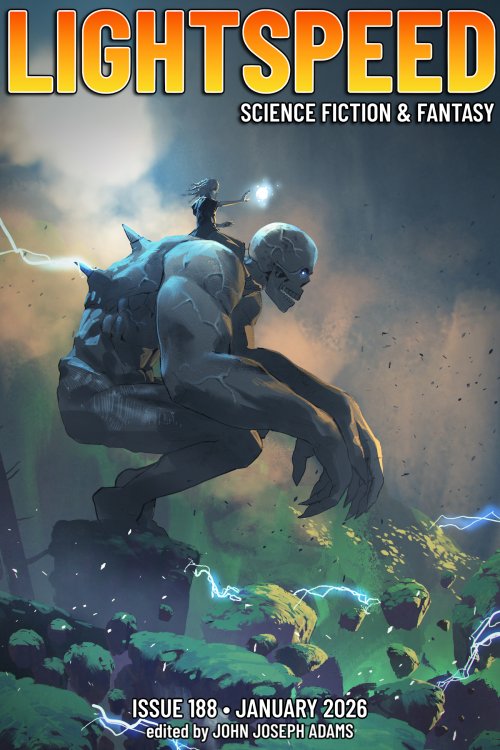“The One Who Isn’t” is an intricate study of relationships, conflict, and the thin line between love and hate. Can you tell us a little about what inspired this story?
I like writing about the intersection of technology and consciousness. It’s a rich seam to mine because it touches upon so many different areas, and unfurls into so many different possible futures. You can pick your rabbit hole and jump. A lot of my stories tend to be thought experiments where I extrapolate from a premise and follow an idea through to a logical conclusion, but with this story I wanted to reverse that process. I had the conclusion right there at the beginning, and then the rest of the story became about answering how we got there.
The initial inspiration in this case came from a fairly mundane visual that flashed in my head. A boy in a room being told a bedtime story. Nothing particularly unusual there, but even in that initial flash, I had the idea that the boy was maybe more than just a boy, and the bedtime story was maybe more than just a story, and even the room was more than it seemed to be. Suddenly there were secrets, and then the rest of the story just kind of grew out of my understanding of the characters, until I had this whole interlocking little puzzle box.
There are elements of Greek and Egyptian mythology, of Morgana le Fey and Mordred from the Arthurian cycle. We see the woman as both the creator and destroyer, the boy as both sacrifice and his own parent. How conscious were you of reimagining a classic myth cycle? Are there other myth cycles or classic stories that have attracted your attention as a stepping stone for future stories?
If you think about it, creation myths are the ultimate stories told in reverse. We know where we are now, and we can guess where we’re going in the future, but the old myths often act to backfill a past that helps us make better sense of the present. They do this in much the same way that some science fiction invents a future that helps us make sense of our lives today, so in a strange way, myths are the inverse of science fiction. Or maybe they’re just another form of science fiction (if without the science). Both serve the same function, but from different directions.
I don’t think I was consciously reimagining any particular classical myth so much as trying to come up with a mythological framework for the lives of the characters that they themselves might have recognized and been able to make sense of. In understanding their own myths, they might better understand who they were.
There are no easy answers in this story. It is an exploration of love, loss, and grief, a conflict with hope as the hostage. As a writer, what elements do you feel make up a strong conflict?
I’ve found that the best stories are sometimes riddles, particularly when grief is involved, because the power behind grief can be so overwhelming. It’s like staring at the sun, and it’ll core you out and burn you blind if you look at it directly, so the way to approach is from the periphery. You sneak up on it, taking only sidelong glances at the subject. Live to write another day. Grief and loss will always win eventually, but you can sometimes earn a little victory here and there. Sometimes a story is a little victory.
Your work has been translated into a dozen or more languages, including Russian, Czech, Polish, French, Hebrew, Romanian, and others. In recent years, more American publishers and audiences have been eager to explore the worlds of international speculative fiction. How have your own works been received in other countries?
I love seeing my writing translated in overseas markets, and not just because it’s a chance to find new readers. Even more than that, I love the idea that there’s a interconnected community out there, with stories going in all directions, and some of the same works of fiction that are being read in the UK are being read in Poland, and Russia, and France, and China, and all over. I’ve been lucky enough to have a fair chunk of my fiction translated, but to be honest, how my stories are received often remains something of a mystery, since I can only read English myself. I do get the occasional nice bit of fan mail from other countries, though.
What sparked your interest in writing fiction?
I think my interest in writing grew naturally out of an interest in reading. Once I fell in love with books and started diving into speculative stories, it seemed natural to start trying to write them myself. I was fairly horrible at it for a long time though. Now that I’m thinking back, I did win a Young Authors contest at my school in second grade, so maybe we can pin some blame on them for encouraging me early. (I lost every year after that, thus tempering me for future decades of rejection.) My mother was also great encouragement to me, and we often talked about the plots of the various stories we read in Asimov’s and F&SF.
Between your novels, short stories, and work on video games, you are busy, busy, busy. What’s next for Ted Kosmatka? What can eager readers and gamers expect in 2016?
I have a couple of different projects in the works, (or solidly started at least,) but video game writing has really been my main focus for most of the last year. Hopefully, I’ll be turning in my next novel sometime before the end of 2016.
Enjoyed this article? Consider supporting us via one of the following methods:










